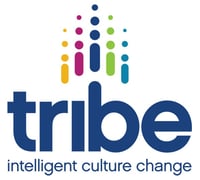
Social networks: a force for good in well-being?
With social networks like WhatsApp and Twitter radically changing how we communicate with one another, a brave new world awaits forward-thinking organisations. And while there’s undoubted risk in these new online platforms, there’s also opportunity – to harness powerful social forces for good, and improve workplace well-being.
We asked Mike Bridge, associate principal consultant at Tribe, how can we make best use of them? Mike has a pedigree in improving businesses, by empowering people to unlock their potential. Here’s his perspective.
What is the challenge as you see it?
“How to use communication positively is a perennial challenge, especially when the tools are evolving as fast as social networks do. Take email and mobile phones for example; they can already get in the way of people engaging with each other. So the real issue lies in how we use social networks in a more meaningful way, to support each other at work.
“One of the biggest well-being problems facing the modern workplace is poor mental health, and supportive communities have a role in tackling that. Mind estimate around 1 in 6 workers have anxiety, depression or stress. And the HSE say the latest estimates from the Labour Force Survey (LFS) show 11.7 million working days were lost in 2015/16 because of these three illnesses, with stress at 45%. Pressures like tight deadlines, too much responsibility and lack of managerial support were the main causes cited by respondents.
“If you look at the most effective, healthy teams, they’re always the ones who value looking after each other. They develop, reward and reinforce positive behaviours that do that. So if online platforms can replicate that, they’ll have a positive impact on well-being. Done well, you can get groups of people recognising when things go right, looking out for each other and correcting problems at source.”
Is it really possible to cultivate these supportive conversations online?
“Many of us are lucky enough to have experienced an atmosphere of care and respect where everyone looks out for each other – the ideal family environment. These environments aren’t abusive, people aren’t put in situations they feel uncomfortable about and they’re involved in decision-making. That usually feels good.
“So why not have that in the wider community you interact with outside of your home too? Why not apply the same values to every social group – whether real or virtual?
“It’s all about getting people talking about what works well, making better products, being more efficient and making people’s jobs easier. What’s not to like about that? If we tap into people’s desire for all that, then this can be about getting what you want out of work, enjoying quality of life and securing a healthier future for yourself.”
Is the secret more positive reinforcement?
“Yes, the most successful organisations get better at celebrating and sharing and encouraging the good. They do that by engaging and empowering people, and openly recognising and accepting people are allowed to make mistakes as long as they’re shared and put right. Once people catch the bug for encouraging each other and learning from them, wonderful things can happen.
“You can kick-start this by choosing a group of people; managers or staff from the frontline, to work as coaches or champions for change. They go out and talk to people, and it’s their job to catch people doing things right, thank and praise them for it – because you want people to do more of that. At the same time, if you see someone doing things wrong, you challenge them, and get their agreement to try a better way in future. That gets the ground fertile for more of the same and starts raising the bar.
“You could compliment this with regular conversations that exchange ideas and share knowledge – to increase the pace of change and cement its effects. These could be well-moderated online forums or steering groups.”
So would you advocate champions who do a similar thing on new social networks?
“Yes, that seems sensible. If you look at LinkedIn, the most active people on there are the ones sharing positive things. They’re seen as influencers, thought-leaders in best-practice or building productive networks.
“On LinkedIn, people share things that are career-enhancing. It tends not to be stuff that’s salacious or destructive, perhaps because there’s a shared expectation that things should stay professional and work-related. Reputation seems to matters a lot more on LinkedIn than on Facebook, because your career, your business and your livelihood are on the line. People understand what’s at stake and it’s become a cultural norm there.
“Perhaps there’s a lesson there – on social networks in a business environment, people tend to post sensible, thought-provoking, life-enhancing ideas. These can often be humorous and fun too.”
What else can you do to promote healthy, supportive networks?
“Coming back to the idea of coaching conversations; things get really interesting when you get other staff, not just champions, talking and looking out for each other. Quite often, a business will call these by different names like ‘near-miss reporting’ for staff generated activity, whereas coaching conversations will have another. They might even have separate databases to store them in.
“With new platforms, like Tribe’s Engage, people can share all of this behavioural improvement and people-support stuff in one place – where everyone can see it and make comments, and positively reinforce it. Indeed, Engage also captures proactive ideas for improvement. Who doesn’t want to transform reporting data into a social commodity that can be used as a force for good?”
Do you believe online social networks are a force for good?
“These new platforms; they don’t have all the answers. They’re just vehicles for the change you want to see and the good intentions that sit behind it. The opportunity is in the speed and scale of what you can achieve with them.
“There are already communities of people who help each other out online, and they’re self-regulating. You see this in awareness campaigning, charities and fundraising, interest group forums and online gaming.
“So: force for good? Yes, like any tool if it’s used well it can do special things.
“Whenever I’ve seen businesses create space for people to come together regularly, on equal terms, to create new norms and better ways of working, it always improves business. Not just in safety but in wider efficiency. I’ve seen this happen using technologies which predate online social networks; so there’s an exciting new opportunity to harness social networks here.
“Ultimately we need to get people talking; encourage them to do good things and celebrate that. This comes back to communities of people positively supporting each other – that has serious downstream benefits for safety, efficiency, health, resilience and better mental well-being.”
See effective conversations in action
Engage, our world-class social network for engagement and insight, is already helping forward-thinking organisations build more effective conversations.
Inspired by Facebook’s intuitive social interface, it helps leaders like you crowdsource continuous improvement by sharing good practice, and indicating issues before they become a problem.
Get in touch to arrange your free demonstration of Engage.



